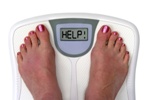What Is Reasonable Weight Loss?
If you read ads in the newspaper, watch infomercials on TV or click on internet pop-ups, you’d assume that quick and easy weight loss is a piece of cake. “Lose 10 pounds in two weeks,” “Lose 10 pounds in 10 days,” and “Lose 10 to 18 pounds in less than six weeks” are just a few of the claims that set our expectations for the task of melting away extra fat. But are those results really possible?
According to the National Institutes of Health and the American College of Sports Medicine, one to two pounds a week is considered safe and appropriate weight loss. This guideline is often cited by the medical community to help dieters lose body fat without also losing lean mass and to avoid dehydration. Safe may be well and good, but one to two pounds a week sure sounds wimpy compared to what the weight loss industry has to offer!
To sort through what’s fantasy and what’s real, consider first what it actually takes to use the energy that 10 pounds of stored body fat represents. At 3,500 calories per pound, 10 pounds of fat represents 35,000 calories of stored energy. The average person burns about 100 calories walking or running one mile. So to lose the 10 pounds in one week, a person would have to run 350 miles or 50 miles per day. This is assuming, of course, that eating habits aren’t changed while adding all that exercise.
Can you imagine expending that much energy? Can you imagine covering 50 miles and not being hungrier than on a day when you didn’t? It is probably safe to say that losing 10 pounds of fat loss in one week, by exercise alone, is nothing short of laughable.
But what about losing 10 pounds of fat in a week by dieting? Is there a way to avoid eating 35,000 calories in a week (5,000 per day)? Considering that a typical middle-aged female (5’5″, 170 pounds, less than 30 minutes of vigorous exercise beyond daily routine activities) maintains her weight on about 1,900 calories per day, this too would be impossible. She can’t possibly eat more than less than nothing! How about eating nothing and running only 31 miles per day for a week? Now that would be a way to combine dieting and exercise to lose 10 pounds of stored body fat. Again, laughable.
Because 10 pounds of body fat in a week is out of the question, how realistic is the two pounds per week “safe” weight loss guideline? Once again, to answer this question, let’s go back to the numbers. Two pounds of fat weight is equivalent to 7,000 calories or 70 miles of running/walking per week. Is it reasonable to expect someone to run 10 miles per day every day of the week and at the same time consume the same food as usual? Or to eat 1,000 calories less than usual for seven days without going crazy? For our sample woman, cutting 1,000 calories would mean eating about half her usual and about 500 calories less than what her body really needs to maintain basic functions at rest.
By now it should be clear that even one annoying pound of fat holds a significant amount of energy. By cutting back food about 300 calories a day and by adding a 2 mile walk each day, a person could expect to lose one pound of body fat each week. If this new routine is kept up each day for a full year, it would represent a hefty 50 pound weight loss. On the other hand, it takes adding only 100 calories more each day (or moving 100 calories less) to add up to an extra 10 pounds in a year.
No matter how you do the math, successful weight management involves setting reasonable and realistic goals. One day’s diet and exercise routine won’t necessarily affect your weight the next day, and it may even take a few weeks for significant weight changes to register on the scale. Keep up with the habit changes, however, and they’re bound to pay off in fat loss as the energy deficits accumulate.
About The Author
Carol Walsh is a registered and licensed dietitian who provides nutrition counseling services http://www.corvallis-clinic.com. Also visit for more weight loss info.
Article Source: http://EzineArticles.com/?expert=Carol_Walsh
- DON'T MISS
- Are You Responsible Enough to Lose Fat?
- The Most Under Rated Aspect Of Weight Loss
- Weight Loss With Water
- Do Quick-Fix Diets Work?
- Tips To Get Rid Of Obesity
- Weight Loss Begins in the Mind
- The Best Weight Loss Exercise Is
- Weight Loss Surgery: Safer and More Effective than Ever
- You’ve Lost the Weight: But How Clean Are You On the Inside-Where It Counts?
- How To Reach All Your Fitness Goals




